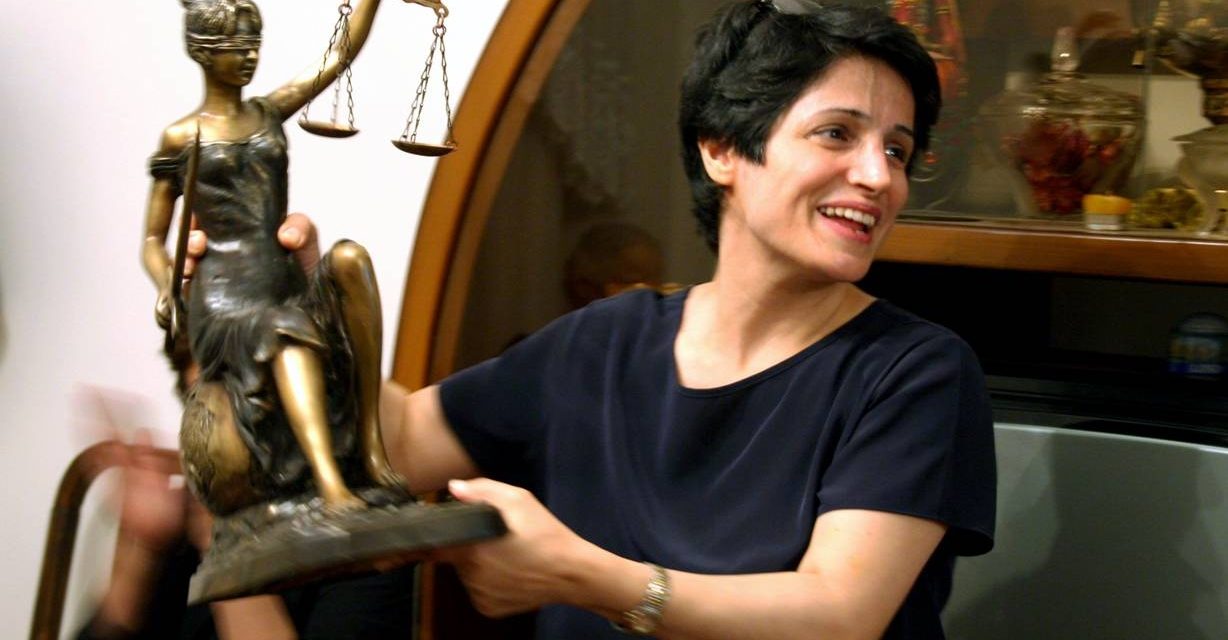Human rights lawyer Nasrin Sotoudeh has been repeatedly imprisoned in Iran (File)
Forty civil society organizations have published a letter urging UN members to adopt a resolution on human rights in Iran.
Canada will present the resolution to the 3rd Committee of the UN General Assembly on Wednesday.
The groups say in the letter, drafted by Amnesty International and Human Rights Watch:
By supporting [the] resolution, the UN General Assembly will send a strong signal to the Iranian authorities that the promotion and respect of human rights is a priority, and that genuine and tangible improvements to the situation are expected to ensure the dignity inherent to all persons in Iran.
They noted the latest report of the UN Special Rapporteur and Secretary General Antonio Guterres’ concern that 2018 has been “marked by an intensified crackdown on protesters, journalists, and social media users”, amid period protests and nationwide demonstrations in January.
The organization says hundreds of people have been detained on vague “national security” charges. Targets include journalists, online media staff, lawyers, students, filmmakers, musicians, writers, trade unionists and activists over women’s and minority rights, the environment, and the death penalty. Detainees are denied a lawyer of their choice.
Iran Daily, Nov 10: Tehran Criticized Over Latest Detentions of Journalists
The UN resolution does note the Government’s amendment of Iran’s drug law, reducing executions, but the groups summarize that the Islamic Republic continues to impose capital punishment for “enmity against God” and “spreading corruption on earth” as well as for some consensual same-sex and extra-marital relationships. Those under the age of 18 at the time of their crime can still be executed, with at least five hanged in 2018 and at least 85 on death row.
The signatories argue:
The UN’s ongoing engagement is necessary in order to press Iran to undertake long-overdue reforms and respect the human rights of all in the country. The Secretary-General and the Special Rapporteur have repeatedly stressed that various laws, policies and practices in Iran continue to seriously undermine the fundamental rights of the people of Iran, including their rights to life; freedom from torture and other ill-treatment; fair trial; freedom of religion or belief; peaceful exercise of the freedom of expression (online and offline), association and assembly; and equal enjoyment of all to education, to health and to work.
They note ongoing discrimination against women; religious minorities, such as Baha’i followers; and ethnic minority activists, including Arabs, Baloch, Kurds, and Azerbaijani Turks.
The Special Rapporteur on Human Rights has not been allowed to visit Iran since 2005.


“The Islamic Republic continues to impose capital punishment for “enmity against God””
The word “moharebeh” is often falsely translated as “enmity” (against God” when it actually refers to “waging war” (against God). It is reserved for those who engage in armed insurrection against the Islamic state or the equivalent.
“2018 has been “marked by an intensified crackdown on protesters, journalists, and social media users”, amid period protests and nationwide demonstrations in January.”
Rudi Giuliani admits why: “These protests are not happening by accident. They’re being coordinated by many of our people (MEK) in Albania.” https://www.theguardian.com/news/2018/nov/09/mek-iran-revolution-regime-trump-rajavi
“They note ongoing discrimination against women; religious minorities, such as Baha’i followers; and ethnic minority activists, including Arabs, Baloch, Kurds, and Azerbaijani Turks.”
That’s interesting considering Ayatollah Khamenei is himself (on his father’s side) from an Azeri Turkish family.
The only people who consider Rudy Giuliani a useful source are ardent pro-Trumpers and Iranian hardliners looking for a pretext to crack down on protesters, activists, journalists, trade unionists, ethnic minorities, and social media users.
I disagree. I tend to believe what the MEK claims about its ongoing activities inside Iran:
https://www.ncr-iran.org/en/news/iran-resistance/25475-pmoi-mek-step-up-activities-during-iran-protests
“As protests continue across Iran, members of the resistance units of the People’s Mojahedin Organization of Iran (PMOI/MEK) escalated their activities on Monday by setting fire to the entrance of a Revolutionary Guards (IRGC) Basij base in Kermanshah, which is home to a number of the regime’s repressive units. Also on Monday, brave MEK members in Qaemshahr set fire to posters of Iranian regime Supreme Leader Ali Khamenei and in Karaj, they raised the flag of the National Liberation Army and chanted “Death to Khamenei, Hail to [Iranian Resistance leader Maryam] Rajavi”, while in Gachsaran, they graffitied “Death to Khamenei” in public places.”
Of course you would — it is convenient to use the MEK as a prop to cover up the repression of those who have no involvement with terrorism (and who actively oppose it).